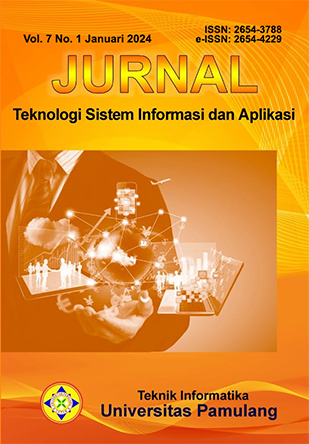Application of Point of Sales Technology in Mobile-Based Bayu Kusuma Stores with Rapid Application Development Method
DOI:
https://doi.org/10.32493/jtsi.v7i1.35878Keywords:
Information System, Point of Sales, Android Studio, Kotlin, FirebaseAbstract
Bayu Kusuma Wholesale Store currently has problems recording transactions. Recording transactions at this grocery store uses a conventional method. Where employees record transactions on the books. This is very detrimental because the number of transactions with available stock is often manipulated. In its completion, a Point of sales technology is needed. transactions made by Bayu Kusuma Wholesale Store via WhatsApp are less effective in providing an online shopping experience. This is because the product catalog and available inventory cannot be displayed directly, making purchasing difficult for customers. In solving this problem, Android-based Point Of Sales technology is needed to record transactions and stock from stores. The Rapid Application Development method is used to solve store problems so that the system is built according to the needs of the store and completes the review of the store that occurs. The results showed that POS used to help process transactions can increase productivity and efficiency in job responsibilities. This can be seen where customers do not need to come to the store to get the product, but order first through the application then bring the item to the store and make payment in cash.
References
Almira, A., Suendri, S., & Ikhwan, A. (2021). Implementasi Data Mining Menggunakan Algoritma Fp-Growth pada Analisis Pola Pencurian Daya Listrik. Jurnal Informatika Universitas Pamulang, 6(2).
Chandra, A. M. (2021). Pengembangan Sistem Point of Sale Pada Dago Cell. Jurnal Ilmu Data, 1(2).
Dwiyanti, Y. H. (2022). Peran Research & Development Expenditures (R&D) Dan Advertising Expenditure (AD) Terhadap Nilai Perusahaan Pada Sektor Perbankan Di Bursa Efek Indonesia. Jurnal Ekonomi Dan Bisnis, 1(1).
Hidayat, N., & Hati, K. (2021). Penerapan Metode Rapid Application Development (RAD) dalam Rancang Bangun Sistem Informasi Rapor Online (SIRALINE). Jurnal Sistem Informasi STMIK Antar Bangsa, 10(1), 8–17.
Ikhwan, A. (2020). Pemetaan Akurat Lokasi Kerja Nyata Dengan Data Monografi Desa. (JurTI) Jurnal Teknologi Informasi, 4(1), 7–12.
Kurniawan, M. A., Fitri, I., & Hidayatullah, D. (2021). Sistem Informasi Bimbingan Skripsi Menggunakan Metode Rapid Application Development Berbasis User Centered Design. Jurnal Media Informatika Budidarma, 5(3).
Natalegawa, R. M. J., & Gunadi, S. (2021). Pengaruh Sistem Informasi Akuntansi Terhadap Efektivitas Pengendalian Piutang Pada PT. Wijaya Kusuma Terang Perkasa. JSMA (Jurnal Sains Manajemen Dan Akuntansi), 13(2).
Purwoko, H., & Tama, B. J. (2022). Aplikasi Penghitung Persoalan Teori Himpunan Berbasis Android Dengan Bahasa Pemprograman Kotlin. Journal Theorems (The Original Research of Mathematics, 6(2), 97–107.
Putri, R. A. (2021). Aplikasi Simulasi Algoritma Penjadwalan Sistem Operasi. (JurTI) Jurnal Teknologi Informasi2, 5(1), 98–102.
Samsudin. (2019). Mobile App Education Gangguan Pencernaan Manusia Berbasis Multimedia Menggunakan Adobe Animate CC. Jurnal Teknologi Informasi, 3(2).
Siregar, L. Y., & Nasution, M. I. P. (2020). Perkembangan Teknologi Informasi Terhadap Peningkatan Bisnis Online. HIRARKI: Jurnal Ilmiah Manajemen Dan Bisnis, 2(1), 71–75.
Siregar, N. N., Suendri, S., & Triase, T. (2021). Penerapan Algoritma Floyd Warshall Pada Sistem Informasi Geografis Lokasi Pariwisata Kota Padang Sidempuan Berbasis Android. JISTech (Journal of Islamic Science and Technology), 6(2).
Suendri, Triase, & Kurniawan. (2019). Sistem Informasi Geografis Pemetaan Lokasi Panti Asuhan di Kota Medan. Journal of Islamic Science and Technology, 3(2), 118–126.
Sugiantoro, S., Alkaff, M., & Radam, I. F. (2020). Rancang Bangun Sistem Identifikasi Arus Lalu Lintas pada Simpang Tiga Menggunakan Database NoSQL. Jurnal Teknik Informatika Dan Sistem Informasi, 6(2).
Susilo, H. (2019). Implementasi E-commerce Sebagai Media Penjualan Online (Studi Kasus Pada Toko Pastbrik Kota Malang). Jurnal Administrasi Bisnis, 29(1), 1–9.
Downloads
Published
How to Cite
Issue
Section
License
Copyright (c) 2024 Salsabilla Thahira, Suendri Suendri

This work is licensed under a Creative Commons Attribution-NonCommercial 4.0 International License.
Authors who publish with this journal agree to the following terms:
- Authors retain copyright and grant the journal right of first publication with the work simultaneously licensed under a Creative Commons Attribution License that allows others to share the work with an acknowledgement of the work's authorship and initial publication in this journal.
- Authors are able to enter into separate, additional contractual arrangements for the non-exclusive distribution of the journal's published version of the work (e.g., post it to an institutional repository or publish it in a book), with an acknowledgement of its initial publication in this journal.
- Authors are permitted and encouraged to post their work online (e.g., in institutional repositories or on their website) prior to and during the submission process, as it can lead to productive exchanges, as well as earlier and greater citation of published work (See The Effect of Open Access).
Jurnal Teknologi Sistem Informasi dan Aplikasi have CC BY-NC or an equivalent license as the optimal license for the publication, distribution, use, and reuse of scholarly work.
In developing strategy and setting priorities, Jurnal Teknologi Sistem Informasi dan Aplikasi recognize that free access is better than priced access, libre access is better than free access, and libre under CC BY-NC or the equivalent is better than libre under more restrictive open licenses. We should achieve what we can when we can. We should not delay achieving free in order to achieve libre, and we should not stop with free when we can achieve libre.
This work is licensed under a Creative Commons Attribution-NonCommercial 4.0 International (CC BY-NC 4.0) License
YOU ARE FREE TO:
- Share - copy and redistribute the material in any medium or format
- Adapt - remix, transform, and build upon the material for any purpose, even commercially.
- The licensor cannot revoke these freedoms as long as you follow the license terms



_2020_-_7(2)_2024_-_Thumbnail.png)












